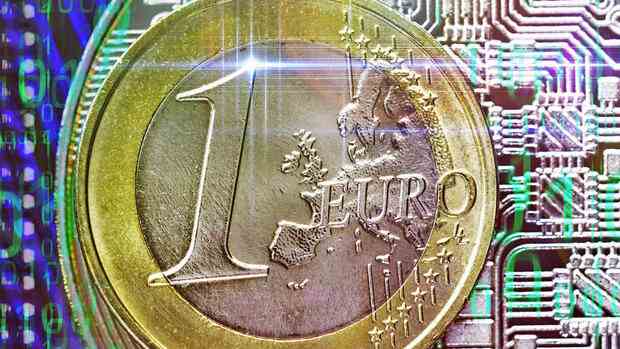PHOTOMONTAGE, one euro coin and binary code, digital euro
(Photo: Bildagentur-online/Ohde)
Everyone is talking about it, the central banks, the EU Commission and more and more commercial banks too: digital central bank money. A few days ago, Great Britain also caused a stir with plans for a digital pound. With a view to the digital euro, the German banks recently demanded a leading role for themselves.
It is not yet clear whether a digital currency will be introduced in the euro area at all. But a project that’s been talked about so much can be hard to stop.
German banks have stressed that there must be a hard cap on holding digital euros. They want to ensure that in the event of a financial crisis, not all customers suddenly withdraw their money from the account and exchange it for digital euros. But what is a digital euro worth that you cannot rely on, especially in a crisis, and that you can only own up to a certain amount, for example 3000 euros?
A core argument for the digital euro is that it gives citizens particularly secure central bank money. So far, this has only been possible for private individuals in the form of cash. But how safe is central bank money that can be automatically converted into normal book money in the bank account?
This is exactly what will happen if someone gets more digital euros than they are allowed to own: the excess then automatically goes to the normal account.
Bad substitute for cash
The great security of the digital euro is considered a particular advantage: this form of money cannot disappear in the event of a bank failure, it is guaranteed by the European Central Bank (ECB) and its offshoots such as the Bundesbank. But this security leads to the insecurity of the system: In the crisis, the banks could lose their balances faster than before, when investors had to queue to withdraw cash. In order to mitigate this insecurity of the system, the availability and ultimately also the security of the new form of money are immediately restricted again. The result is a poor compromise.
So the question is: why not leave it as it is? We have all been able to pay without cash for a long time. Some people resent the market power of credit card providers and companies like PayPal. But setting up the public sector as a competitor in order to break private market power would be a questionable argument and is not even used officially.
The problem is probably that you don’t want to admit that you have already invested a lot of effort in a largely meaningless project. But it should be clear: Not everything digital is really innovative, and not every innovation really makes sense. It’s not too late to stop the twisted project.
More: How ECB Director Panetta argues for the digital euro
